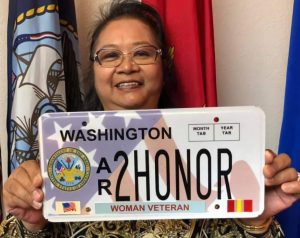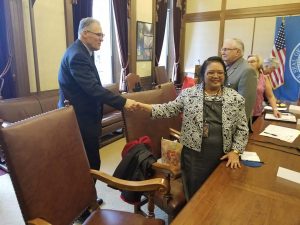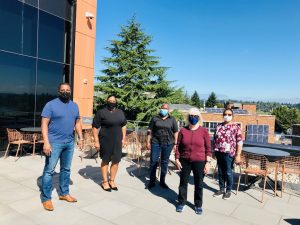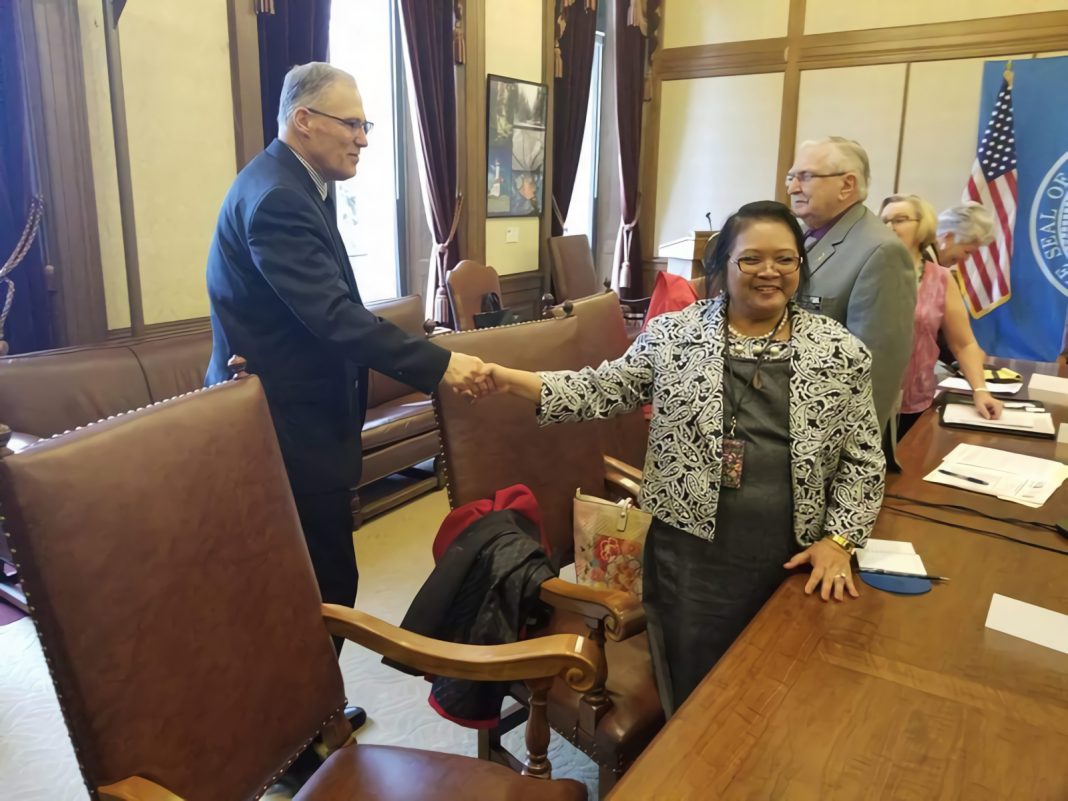When Liza Narciso left the Philippines to migrate to the United States in 1980, she had no idea that one day she would join the U.S. Army or, later, address issues impacting women veterans with congressional members.
 “It’s a privilege to talk about my experiences,” Narciso says. “It’s humbling.”
“It’s a privilege to talk about my experiences,” Narciso says. “It’s humbling.”
Narciso is the Washington State Women Veterans Coordinator and the Assistant to the Director for the Washington Department of Veterans Affairs in Olympia. She says her family was not sure she was cut out for military service when, as a young woman, she enlisted without first telling her parents. “The day I left we had 50 of my relatives send me off to boot camp,” she says. “All of my family was taking bets on how long I would last. They were taking bets on whether I would survive basic training.”
Narciso not only survived, she thrived. Narciso was in the top graduates in basic training. She served four years active duty and three years in the reserves. During that time, she met her husband, who was also serving in the U.S. Army. They were married on Veterans Day.

Narciso says she left the army when she became pregnant. She says the military was not family-oriented back then and could not guarantee that she and her husband would be jointly domiciled. She did not have parental leave. “And I worked until the day I had my contractions,” she says.
She says for many years afterward she did not identify herself as a veteran, thinking that veterans are typically older men who spent decades in the military. “My priority when I got out was not to inquire about benefits,” she says. “It didn’t dawn on me to look into benefits, thinking that I was not a ‘veteran.’ I was a young mother and a spouse.”
And, when she later applied for a veteran identification card, Narciso says the federal agency representative told her the line she was waiting in was only for veterans. Narciso explained to the representative that she had served, saying, “What is the face of a veteran to you?” She adds, “I believe that is one of the things as to why women don’t come out (to collect benefits). Our service is questioned. You have to validate yourself. And, as a minority, it’s harder.”

The data confirms that women are less likely to receive benefits and services. “To date, there are 60,000 women veterans in our state but only about 19,000 are connected to their earned benefits,” she says. “The highest percentage (of recipients) is in Thurston County, and that’s about 46%.”
That is why in her state, national and local roles, Narciso educates women who were in the military to confirm that they are veterans entitled to services and benefits. In addition to her position as assistant to the DVA director, she serves on the department’s Women Veterans Advisory Committee. That committee works to ensure that Washington’s women veterans have equitable access to federal and state veterans’ services and benefits. She assists the Governor’s Veterans Affairs Advisory Committee and has served on the Thurston County Veterans Advisory Board. And, she is president of the National Association of State Women Veteran Coordinators (NASWVC).
While the military brought her travel and family, it also brought pain. Narciso has experienced military sexual trauma (MST). MST results from sexual harassment, assault or battery in the military, and is a significant problem. Narciso was a victim of sexual assault. She says it took years for her to recognize what happened and gather the courage to seek help. She now advocates for others living with the effects of MST. She says MST is another reason women veterans may be reluctant to apply for benefits. “After what they had to experience in the military, they don’t want anything to do with government,” Narciso explains. “They don’t trust the government. ‘They are the ones that broke me, and they can’t put me back.’”

Narciso has shared her perspective with the U.S. Congress. She recently spoke with U.S. Sen. Patty Murray, who serves on the U.S. Senate Committee on Veterans’ Affairs, about issues facing women veterans. As NASWVC president, Narciso provided formal remarks in 2020 and 2021 to the U.S. Senate and U.S. House of Representatives Committees on Veterans’ Affairs. Her remarks supported legislation assisting former military and their families who are suffering the impacts of veterans’ MST, homelessness, lack of health care, and suicide.
Narciso says the federal process to apply for benefits can be like thinking you are going swimming in a lake then you discover you are in an ocean. She helps veterans maneuver through the system. “I tell my fellow veterans it will take a lot of time and effort,” she says. “I feel very authentic because I have gone through the process myself and I know the frustration that entails.”
If you are a woman veteran in need of help with benefits or other military-related questions, check out the Washington State Department of Veteran’s Services and the U.S. Department of Veterans Affairs website.




















































